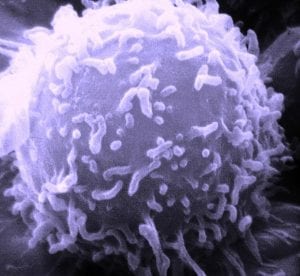A single blood test may act as a simpler and more efficient “universal” cancer diagnosis according to a recent study conducted at the University of Bradford (1).
Scientists led by Diana Anderson believe that the lymphocyte genome sensitivity assay (LGS), can accurately detect cancer in patients without the need for a series of tests for various cancer types. The LGS measures genomic damage, to which cancer cells are more susceptible (1).

Lymphocytes, or white blood cells, are used to measure genomic sensitivity to mutagens like ultraviolent light.
Source: Wikimedia Commons
The study involved 208 subjects, 58 patients diagnosed with various cancers, 56 pre-cancerous patients, and 94 healthy volunteers. Anderson and her team exposed the volunteers’ blood samples containing lymphocytes, or white blood cells, to ultraviolet light (UVA) to induce genomic damage (1).
They then ran these cells on an agar gel via electrophoresis, which produces visible, comet-like “tails” indicating DNA damage under fluorescence microscopy. Percentage tail DNA and 100 Olive tail moments (OTMs) provide specific measures of genomic damage. The longer the tail, the greater the damage to the cell’s DNA (1).
All subjects demonstrated an increase in percentage tail DNA and OTM when exposed to UVA (1).
However, Anderson and her team discovered that the diagnosed cancer patients’ lymphocytes experienced greater UVA sensitivity and DNA damage than both at-risk patients’ and healthy subjects’ lymphocytes. While healthy subjects’ lymphocytes returned to control OTM measurement after stopping UVA exposure, cancer patients’ lymphocytes demonstrated a significantly smaller decrease in OTM. Likewise, the pre-cancerous patients demonstrated a middling response (1).
The LGS possesses a higher sensitivity than many current cancer diagnostic tests, although it cannot distinguish among specific cancers. Based on the discovered logistic relationship between OTM and probability of having cancer, scientists can set OTM thresholds for cancer diagnosis (1).
Before the LGS assay can be established as a universal diagnostic test, scientists hope to test both larger populations and specific subpopulations to create a more sensitive test (1, 2).
Anderson acknowledged this fact, explaining, “These are early results completed on three different types of cancer and we accept that more research needs to be done; but these results so far are remarkable.” The Bradford Royal Infirmary is currently testing the LGS assay with colon cancer patients (2).
References
1. D. Anderson et al., Sensitivity and specificity of the empirical lymphocyte genome sensitivity (LGS) assay: implications for improving cancer diagnostics. The FASEB Journal.28, 1-8 (October 2014).
2. University of Bradford. “Potential ‘universal’ blood test for cancer discovered.” ScienceDaily. ScienceDaily, 28 July, 2014. <http://www.sciencedaily.com/releases/2014/07/140728094410.htm>.
Leave a Reply